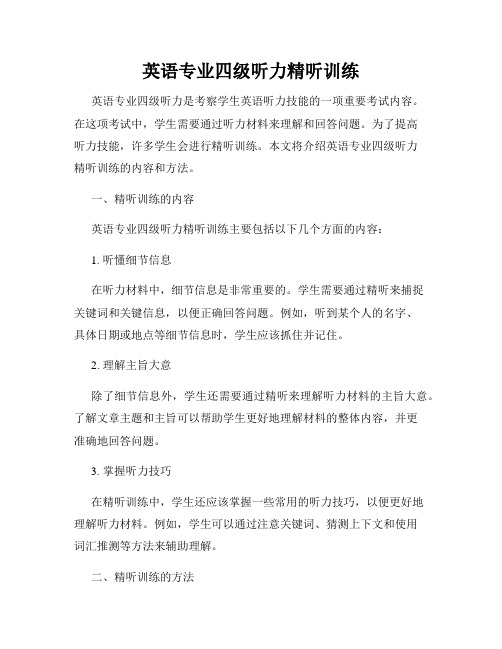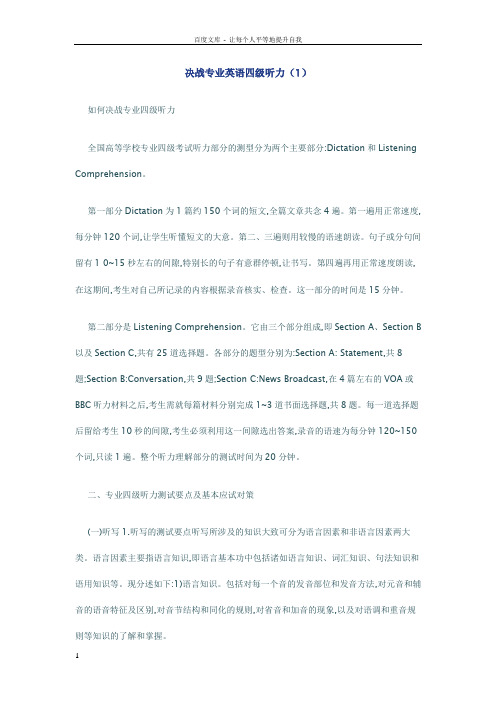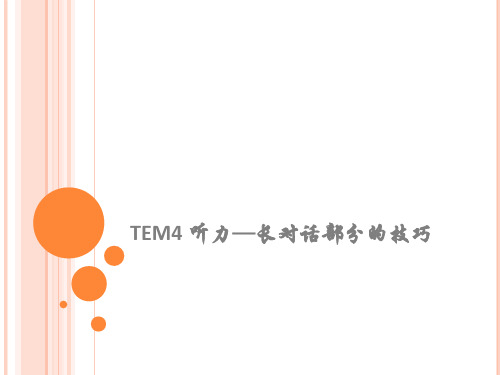专四听力教学内容
《专四听力技巧》PPT课件

针对听写的考试现状,考生如何提高听写成 绩呢?
• 第一,考前要充分了解听写的形式,最好进行一次模拟实践,体 会全过程。
• 第二,根据朗读方式,选用相应的书写技巧。如在听第一遍时, 重点听主题思想和重点词,掌握全文大意,不要一听录音就写, 因为这样急着写,也许能写出前边的单词或句子,却有可能不知 全文的大意;听写的第二遍和第三遍朗读是以意群为单位重复的, 在第二遍朗读录音时,要以意群为单位去理解。因时间关系,不 可能一词一词地全部写下,所以要分清主次信息,抓句型和关键 词(主语、谓语等),在听第三遍时,再把其他部分,如修饰语、 定冠词等遗漏内容补上,若有些词还来不及写,可先用一些自己 认识的缩略形式,甚至特殊符号代替,等最后一遍核查时或结束 前的两分钟检查时间时再补写出原形。听写的评分不是以写出的 单词多少,而是先以是否把原文的主要意思表达清楚,然后以是 否有大小错误,如单复数,大小写、遗漏冠词等,来决定扣分的 不同。此外,如果在听的过程中有个别词或词组一下子反应不出 来,就不要苦苦纠缠单个的词,要跟着录音进行下一意群的听写, 因为听写评阅标准把全文根据15个意群分割成15分,每个意群最 多扣一分,所以某个意群中的个别单词或词组的错误或遗漏不会 影响其他意群的得分。而对于听不懂的单词,不妨先根据读音6 写 下音标,等回头检查时再想。
the solution。
•
4)小错误扣分标准:小错误在一节中出现一次,留作总计;
出现两次,扣0.5分;出现三次, 扣0.5分后留一小错做总计;
出现四次(以上),扣1分。
•
5)未扣分小错误的扣分标准: 5-8个:扣1分。
累计2-4个:扣0.5分。
累计 9
•
B. 大错误:
•
漏写、加词、造词、换词(冠词作小错计),大移位,时态
英语专业四级听力精听训练

英语专业四级听力精听训练英语专业四级听力是考察学生英语听力技能的一项重要考试内容。
在这项考试中,学生需要通过听力材料来理解和回答问题。
为了提高听力技能,许多学生会进行精听训练。
本文将介绍英语专业四级听力精听训练的内容和方法。
一、精听训练的内容英语专业四级听力精听训练主要包括以下几个方面的内容:1. 听懂细节信息在听力材料中,细节信息是非常重要的。
学生需要通过精听来捕捉关键词和关键信息,以便正确回答问题。
例如,听到某个人的名字、具体日期或地点等细节信息时,学生应该抓住并记住。
2. 理解主旨大意除了细节信息外,学生还需要通过精听来理解听力材料的主旨大意。
了解文章主题和主旨可以帮助学生更好地理解材料的整体内容,并更准确地回答问题。
3. 掌握听力技巧在精听训练中,学生还应该掌握一些常用的听力技巧,以便更好地理解听力材料。
例如,学生可以通过注意关键词、猜测上下文和使用词汇推测等方法来辅助理解。
二、精听训练的方法为了提高英语专业四级听力精听能力,学生可以尝试以下几种训练方法:1. 听力练习通过大量的听力练习,学生可以逐步提高自己的听力技能。
可以选择一些与专业相关的听力材料,如英语专业学术讲座、学术讨论等。
在练习过程中,可以多次听同一段材料,以提高对细节信息的捕捉能力。
2. 口语练习口语练习可以帮助学生更好地运用听到的知识。
通过和他人进行口语对话,学生可以巩固已经听到的内容,并提高口语表达能力。
3. 笔记技巧在听力训练过程中,学生可以尝试使用不同的笔记技巧来帮助记忆和理解。
例如,可以用图表、表格、思维导图等方式记录重要信息,以便后续回顾和复习。
三、总结英语专业四级听力精听训练对于提高学生的听力能力非常重要。
通过对细节信息、主旨大意的理解以及掌握听力技巧,学生可以在考试中取得更好的成绩。
因此,学生应该积极参与精听训练,并结合口语练习和笔记技巧来提高自己的听力水平。
这样,他们将更好地应对英语专业四级听力考试的挑战。
专四听力技巧-对话

应试策略: 〔1〕可先从卷面选项中判定可能出现的几种场
听力理解—对话(Conversations)
地点与方向题
应试策略:
〔2〕重点听清楚与特定地点有关的常用词或 词组,如reserve, check in / out, menu, assignment, postage之类的词所代表的 场所。
〔1〕主旨要义题:问对话讨论的是什么主题。 〔2〕身份职业题:问说话者的身份、职业以及
两者的关系等。
〔3〕地点方位题:问对话发生的地点与场景。 〔4〕时间、数字计算题:对对话中出现的一些
时间和数字进行提问,通常要经过一些简 单的运算。
〔5〕事实推理题:对对话中出现的一些细节进 行提问,或者要求考生通过所听到的细节 进行推理。
postgraduate
vacation
scholarship
credit junior
tuition senior
register
graduate
Semester / term quiz
mid-exam
final
听力理解—对话(Conversations)
身份职业题
常见的身份、职业以及相关的词语和句子,如下表所列: Customer and waiter / waitress
〔2〕每组对话约为200个单词,通常为一男一 女之间就某个或者几个话题进行答复,以 求得到彼此希望获得的信息或答案,或求 得一致的意见。
〔3〕听力对话内容涉及广泛,主要有生活、工 作、学习、家庭、时事、风土人情或社会 焦点问题等等。
听力理解—对话(Conversations)
专四听力讲义-真题精讲

听力题型介绍 听力评分标准 听力考点及难点 课程框架介绍 如何备考听力
第一部分 导学课
一、听力题型介绍
二、评分标准
Dictation 1. 10 小节,每节 1 分,每节最多扣 1 分 2. 重复错误,仅扣一次分 3. minor mistakes
一节中出现 1 次留作总计 出现 2 次,扣 0.5 分 出现 3 次,扣 0.5,留一处作总计 出现 4 次以上,扣 1 分
• 不完全爆破 1. 辅音/p/,/b/,/t/,/d/,/k/,/g/是爆破音。当一个爆破音的后面紧跟着另一个爆破音 时,前一个爆破音只按其发音部位做好发音口形、形成阻碍,而不爆破出来,稍微停顿后即发出 后面的辅音,这种现象称为不完全爆破。 spectacular/spe(k)ˈtækjulɚ/ countdown/ˈ kaun(t)daun/ great power/grei(t) ˈpaʊɚ/ victim/ˈ vi(k)tim/ 2. 英语音标中还有一种摩擦音,它们是/f/,/v/,/s/,/ z/,/dz/,/ts/,/h/ ,当爆破音 后面紧跟着摩擦音时,只有轻微爆破,也称为不完全爆破。 outside /ˈaʊ(t)ˌsaɪd / big house /ˈ bi(g) ˈ haus/ good friend /ˈ gu(d) ˈ frend/ can't sing/ ˈ ka:n(t) ˈ sɪŋ /
• 弱读音节 some /sʌm/-/səm /-/sm/ have/hæv/-/ həv/-/v/ must/mʌst/-/məst/- / ms / and/ænd/- / ənd / - / ən/ of/ov/-/əv /- /v/ - /f/ were /w3:/- / wə/
专四听力要点解析

❖
are an exception → are essection 扣一个小错误加一
个大错误
❖
combat → come back 扣一个大错误
F. 总分只有0.5时,以1分计算,其余总分中如 含小数点的,小数舍去,保留整数。
G. 空白卷一律0分
Script:
Cars in the Future
❖ ⑤ 未扣分小错误的扣分标准:
❖
累计2-4个,扣0.5分
❖
累计5-8个,扣1分
❖ *大错误:漏写、加词、造词(冠词以小错计)、大移 位、时态错误,扣0.5分
❖ race → west, raised, risk ❖ flying → fine, fined, dinning ❖ loved → love; ❖ while → were ❖ generally → general; ❖ self-conscious → sub-conscious / of-conscious
❖ ③ 冠词、单复数错误:
❖ With fortune hunters → with the fortune hunters
❖ 90 percent → 90 percents
❖ ④ 小错误扣分标准:在一节中出现一次,留作总计;出 现两次,扣0.5分;出现三次,扣0.5分后留一小错误作总 计;出现四次,扣1分。
问一答的短对话变成长对话。 (10道,约,3个长对 话)
Section B:短文理解篇幅较长,比以前增加难 度。(10道,约3篇)
Section C:保留新闻广播。(10道,约5-7篇)
二、各部分评分标准及应试技巧建议
1. 听写
(1) 简介:由英美国家专家专门录制,或英式或美 式,但要求不带地方口音。全文共读4遍。第一 遍为正常语速,约120词/分钟,要求考生此时 从整体上理解文章内容,抓住中心大意;第二、 三遍为慢读,根据意群停顿,停顿时间约15秒, 要求考生准确写出所听内容;第四遍语速跟第 一遍一样,考生边听边对校。全文听完后,有2 分钟的复查时间。
专业英语四级听力详解

决战专业英语四级听力(1)如何决战专业四级听力全国高等学校专业四级考试听力部分的测型分为两个主要部分:Dictation和Listening Comprehension。
第一部分Dictation为1篇约150个词的短文,全篇文章共念4遍。
第一遍用正常速度,每分钟120个词,让学生听懂短文的大意。
第二、三遍则用较慢的语速朗读。
句子或分句间留有1 0~15秒左右的间隙,特别长的句子有意群停顿,让书写。
第四遍再用正常速度朗读,在这期间,考生对自己所记录的内容根据录音核实、检查。
这一部分的时间是15分钟。
第二部分是Listening Comprehension。
它由三个部分组成,即Section A、Section B 以及Section C,共有25道选择题。
各部分的题型分别为:Section A: Statement,共8题;Section B:Conversation,共9题;Section C:News Broadcast,在4篇左右的VOA或BBC听力材料之后,考生需就每篇材料分别完成1~3道书面选择题,共8题。
每一道选择题后留给考生10秒的间隙,考生必须利用这一间隙选出答案,录音的语速为每分钟120~150个词,只读1遍。
整个听力理解部分的测试时间为20分钟。
二、专业四级听力测试要点及基本应试对策(一)听写1.听写的测试要点听写所涉及的知识大致可分为语言因素和非语言因素两大类。
语言因素主要指语言知识,即语言基本功中包括诸如语言知识、词汇知识、句法知识和语用知识等。
现分述如下:1)语言知识。
包括对每一个音的发音部位和发音方法,对元音和辅音的语音特征及区别,对音节结构和同化的规则,对省音和加音的现象,以及对语调和重音规则等知识的了解和掌握。
2)词汇知识。
包括对词汇的分类、构词规则,以及习语、短语的了解和掌握。
3)句法与语义知识。
包括对句子结构,句型转换规则,语义特征如歧义、反义等知识的了解和掌握。
专业四八级英语专业四级真题听力讲解精品PPT课件

happy with it. M: No, I certainly am not. W: Well, if I could just have the receipt. M: Oh, yes. Well, there is a slight problem about the receipt.
W: And what is that? M: Look. It says here that the noise from it should be undetectable by other
people. W: Yes, that’s right. M: But people can hear it, and t’s really embarrassing on the bus and
underground. W: Well, I’m sorry, but it must be the way you are wearing the headphones. M: Look. I know how to put earphones in my ears. Thank you very much. But
conversation?
M: You have been in a university before, haven't you?
W: Yes, in Britain.
M: How do students go about getting jobs when they graduate?
专四听力教案

专四听力教案教案标题:专四听力教案教案目标:1. 帮助学生提高专四听力技能,包括听取信息、理解主旨、推断态度和观点等。
2. 培养学生的听力策略,如预测、笔记和关键词标记等。
3. 提供练习机会,以增加学生对不同听力题型的熟悉度和应对能力。
教学重点:1. 培养学生对各种听力题型的理解和应对能力。
2. 帮助学生掌握有效的听力策略,以提高听力表现。
3. 强化学生的听力技巧,如捕捉关键词、理解上下文等。
教学准备:1. 选取专四听力真题或相关听力材料。
2. 准备录音设备或电脑播放器。
3. 准备黑板、白板或投影仪。
教学步骤:步骤一:导入(5分钟)引入本节课的主题和目标,激发学生对听力学习的兴趣。
可以通过提问或展示相关图片来引导学生思考和讨论。
步骤二:预测和预测问题(10分钟)让学生在听之前预测听力材料的主题、内容和可能出现的问题。
鼓励学生根据题目或问题预测关键词,以便在听力过程中更好地捕捉信息。
步骤三:听力训练(20分钟)播放一段专四听力材料,根据题目要求,学生进行听力练习。
可以根据听力材料的难度适当调整播放次数,确保学生能够听清并理解听力内容。
步骤四:答案讲解和讨论(15分钟)播放结束后,与学生一起讲解答案,并与学生讨论各题的解题思路和答题技巧。
引导学生总结出有效的听力策略,如捕捉关键词、理解上下文等。
步骤五:巩固练习(15分钟)提供一些与专四听力题型相似的练习题,让学生进行个人或小组练习。
鼓励学生应用刚刚学到的听力策略,并及时给予反馈和指导。
步骤六:总结和反思(5分钟)与学生一起总结本节课所学的听力技巧和策略,并鼓励他们反思自己的听力表现和不足之处。
提供必要的建议和指导,以帮助学生进一步提高听力水平。
教学延伸:1. 鼓励学生多听英语原版电影、新闻和讲座等,以提高听力理解能力。
2. 提供更多的专四听力真题和模拟试题,让学生进行反复练习。
3. 鼓励学生利用各种听力资源,如听力App、听力网站等,进行自主学习和练习。
- 1、下载文档前请自行甄别文档内容的完整性,平台不提供额外的编辑、内容补充、找答案等附加服务。
- 2、"仅部分预览"的文档,不可在线预览部分如存在完整性等问题,可反馈申请退款(可完整预览的文档不适用该条件!)。
- 3、如文档侵犯您的权益,请联系客服反馈,我们会尽快为您处理(人工客服工作时间:9:00-18:30)。
2014专四听力TalkHow to Succeed in Your Literature ClassⅠ. Features of literature class—(1) freedom with personal ideas encouragedⅡ. Three pieces of advice for literature class learnersA. In advance—for large lectures:—greater progress and more (2) in the lecture—for small lectures:—(3) in open discussion—target of literature class:—general aspects of important books—subtle differences of how stories are crafted—drill in reading and (4) of huge amounts of informationB. Closely—method:—reading all materials instead of (5)—paying more attention to style and deeper intention instead of plots or (6) —requirement of literature papers:focused and (7)—benefit to paper writing:—learning to defend personal interpretations with (8) evidenceC. Questioningly—not afraid of possible contradictions—display of full thought in arguments with (9)Ⅲ. The additional tip—selection of a course with (10)Conversation One1.[A] Federal government. [B] Individual public schools.[C] The education chief. [D] Individual states and districts.2.[A] Because it enables teachers to prepare for subject matter in more depth.[B] Because it can put students at a competitive advantage.[C] Because it is more suitable for current economy.[D] Because it is gaining increasing popularity in the US-3.[A] Extending school year can reduce the quality of the time in class.[B] Extending school year can interrupt family life.[C] Extending school year doesn’t necessarily improve test scores.[D] Extending school year may increase the cost of schools.4.[A] More learning experiences.[B] The avoidance of summer learning loss.[C] More time for teacher-student interaction.[D] Reducing gap between the rich and the poor.5.[A] He is strongly in favour of Miriam’s ideas.[B] He is mildly in favour of Miriam’s ideas.[C] He is strongly against Miriam’s ideas.[D] He is mildly against Miriam’s ideas.Conversation Two6.[A] English Literature. [B] Computer.[C] Business Administration. [D] Finance.7.[A] The working environment was poor. [B] The job was boring.[C] The pay was rather low. [D] He disliked his employer.8.[A] Enthusiastic. [B] Perseverant. [C] Eloquent. [D] Cooperative.9.[A] Overtime work. [B] Regular work. [C] Work of leadership. [D] Varied work.10.[A] Doctor’s note is not necessary for a one-day sick leave.[B] Some employees used to take advantage of its loopholes.[C] All the terms in it are preferred to the candidate.[D] Paternity leave is as long as maternity leave when the first child is born.Limiting the Growth of TechnologyThroughout history man has changed his physical environment to improve his way of life. With the tools of technology man has altered many physical features of the earth. However, these changes in the physical environment have not always had beneficial results. Today, pollution of the air and water is a danger to the health of the planet. Smoke from factories pollutes the air of industrialized areas and the surrounding countryside. The pollution of water is equally harmful. It is now necessary for man to limit the growth of technology in order to survive on earth.How to Succeed in Your Literature ClassGood morning everyone, our topic today is about how to do well in your literature class in your college days. Literature courses and assignments tend to be extremely different from those of any other discipline because of their extreme subjectivity. Thisaspect is what many people tend to find most surprising and challenging in an academic setting.(1) I am not saying that you can throw reason and fact out of the window in literature courses,but von arc given much more intellectual freedom with your personal thoughts and ideas.Beginning with the “in advance” piece of wisdom. For large lectures students often think it is not that important to do the readings since they will not be forced to speak up and offer opinions. This is completely wrong. Why attend a lecture on a piece of writing that the professor assumes you have read? (2) You will take nothing away from the lecture and will not be able to make any sense of whatever notes you take, even if you read the material after the fact.(3) In small classes that have lots of open discussion,professors can always tell who has and who has not done the week's reading. Don’t think it won't affect your participation grade for the course.The entire point of a literature class is to engross a student in the general aspects of important explore many subtle differences of how stories are crafted, and to train the college scholar to read and (4) digest huge amounts of information. You won’t do well in the course without making a sincere attempt to read and understand every assigned text.Next, make sure you read all material very closely. (5) Do not skim through seemingly unimportant passages of long novels, or read Spark Notes and think you know what happens in the reading. (6) These methods of “reading” leave you without any idea of the author’s style or deeper intentions: they merely give you plot or surface meanings. Reading things halfway will be of no benefit to you when it is time to write your papers.(7) Literature professors usually want papers that are very sharply focused and detailed. (8) There is DO single answer or interpretation to most pieces of literature,but students must be able to read closely enough to defend a case with textual evidence that will support their personal interpretation.Finally,do not feel defeated if you find a piece of evidence in the text that seems to contradict the line of thinking you had developed about the piece of literature. (9) Literature papers and discussions should question every theory by offering counterevidence. As I previously said, clear-cut answers do not exist in any form of literature, be it poetry, fiction, essays, or even nonfiction. You must read all genres with a discerning eye,and instead of avoiding possible conflicts in your papers, use them to show that you have fully thought through your arguments.And the last piece of advice I have to offer: look at the reading lists of literature courses are considering so you do not make yourself miserable by spending asemester reading literature you have no interest in. (10) Literature courses should be enjoyable, and their readings stimulating, so find one that interests you and begin analyzing everything!OK, today I’ve given several tips to you regarding the ways of succeeding in your literature class. I hope they could help you get your hands on the class when you are ready to go. Thank you for listening.对话1W: Hello,Frank.M: Hello,Miriam. How’s everything going?W: Fine.M: Would you like to join me for a drink?W: OK, thanks.M: Any news recently?W: Oh,well,yesterday I read the newspaper and got very shocking news. You know,(1) it’s not the government that sets the calendar for our public schools. Public school calendars are set by individual states and districts. According to the news, our local school decided to keep students in class year-round with shorter breaks throughout,offering about 20 additional school days.M: Mm…, (2) I heard that the education chief said in an interview that our current school calendar based upon the agrarian economy and the vast majority of the students in our country weren’t wor king the fields in the summers. So he…he thought it was really an outdated, outmoded model. It needed be changed.W: I don’t agr ee with him. Extending school year seems so completely short-sighted to me, (3-1) More time is no silver bullet for reform. Take Miami-Dade County Schools in Florida for example, it used an extended day program for three years,but dropped it because they d idn’t see improvement in test scores. (3-2) Besides, it disrupt family life.M: Well, surely you must have to admit that we have a significantly shorter school year. Our students are going to school 180 days a year, generally. And if in a sports contest, one team is practicing three days a week and one team is practicing five days a week, the team that is practicing more is going to do better.W: But simply extending school time in and of itself will not produce the desired results.M: Well, yes. Mm…; but, extending school time does bring some advantages. (4-1) It gives the students learning experiences that they might not be able to get over the summertime.W: But you ask the teachers and students whether, whether they reckon that extending school time brings them advantages. I think it goes without saying that no one wants to extend bad time. The teachers are fatigued at the end of the day, and the students are fatigued and unmotivated. The students need summer break to have a good rest.M: Yes, you are right. (4-2) But without those camps and other stimulating activities,something called summer learning loss occurs. Researchers estimate that low-income students can lose two months of math and reading achievement owing to a lack of reinforcement during the summer break. It’s particularly true for low-income kids who don’t have the opportunities that other kids have during those big breaks. W: But have you considered this? Extending the school day is very very expensive. The Miami-Dade program cost more than $ 100 million.M: Yes, you are right, (3-3) Really it can result in increased cost because more teachers, specialists, paraprofessionals, and other staff are deployed. But I think it can bring some… some benefits to students and teachers as well, for example, umm,it allows teachers to delve into subject matter in more depth? (4-3) it builds in time for more teacher-student interaction; and, it makes it possible for students to spend more time on task.1. Who set the public school calendars?2. Why does the education chief support extending the school year?3. According to Miriam, which of the following statements is INCORRECT?4. Which of the following is NOT an advantage of extending the school year cited by Frank?5. What do we know about Frank according to the conversation? …Conversation TwoW: Good morning,Mr. Smith. Have a seat, please!M: Thanks a lot.W: What is your major?M: My major is Business Administration. I am espe cially interested in “Marketing”. W: Have you received any degrees?M: Yes. (6-1) First, I received my Bachelor’s degree in English Literature, and then an MBA degree.W: Do you feel that you have received a good general training?M: (6-2) Yes,I have studied in an English training program and a computer training program since I graduated from university. I am currently studying Finance at a training school.W: Your resume says that you have had one-year experience working in a foreign representative office in Shanghai, may I ask why you left?M: I worked in a foreign rep. office for one year. (7) However, I left there two years ago because the work they gave me was rather dull.W: If you believe you are a good fit for the position, please talk about what kind of personality you think you have.M:(8 -1) I always approach things very enthusiastically. When I begin something, I don,t like to leave it half-done.W:And what are your personal weaknesses?M: (8 - 2) I’m afraid I,m a poor talker. I’m not comfortable talking with the people whom I have just met for the first time. That is not very good for business, so I have been studying public speaking.W:It is very difficult for somebody to see one’s own weakness. Are you more of a leader or a follower?M:(9 -1) I don’t try to lead people. (8-3) I’d rather cooperate with everybody, and get the job done by working together.W: You know, most workers are working under great pressure. How about overtime work?M: Overtime work is very common in companies. (9-2) I can work overtime if it’s necessary, but I don't think we will work overtime every day.W:Do you like regular work?M: (9-3) No,I don’t like regular work. I am interested in different projects with new opportunities. But I can do regular work if the company needs me to do so.W: You performed very well, sir! If you have no questions, please go through the contract and sign it.M: OK. Thank you very much.M: I have a few questions for you. First, I’d like to know if you offer employees sick leave.W:Yes, employees can take up to 10 days of sick leave per year. (10-1) However, in order to get paid,you’ll have to bring in a note from the doctor’s.M:(10-2) Even if I’m only sick for one day?W: (10-3) That’s correct.M: (10-4) That’s pretty strict,if you ask me.W: (10-5) Well, we’ve had to add that to the contract because we found that many of our employees were taking almost one sick day a month,even though they weren’t sick.M:I see. I guess that makes sense. How many days of paternity leave do you offer? W:(10-6) Men are allowed to take 10 days of paternity leave for their first child. M:(10-6) Why are women flowed so much more time for maternity leave?W: Well, women are the ones giving birth. I think it,s fair to give them more time, don’t you?M: I guess so. I don’t have any other questions. Should I sign here then?W: Yes, please.。
